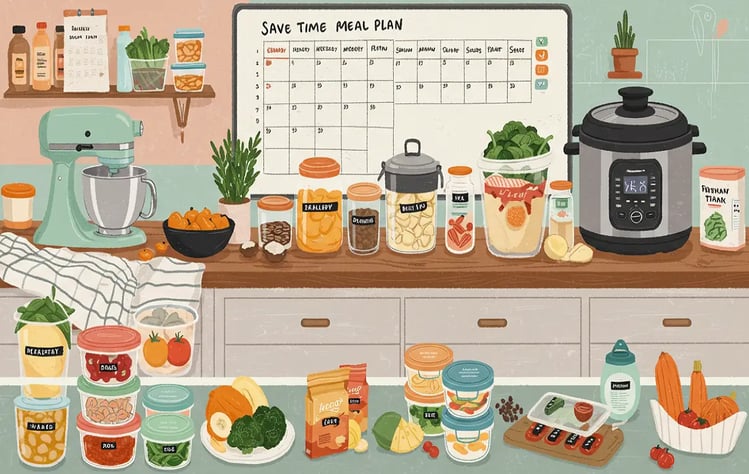
Boost Efficiency: How to Apply Fundamental Food Prep Methods
With the basics in mind, delve into specific techniques that streamline your cooking pro-cess. This helps you apply fundamental methods in a way that boosts overall efficiency.
FOOD PREPARATION
Mae Ellison
2/25/20255 min read


Food Prep Techniques for Efficient Cooking
Introduction: The Importance of Food Prep for Efficient Cooking
In today’s fast-paced world, finding time to cook healthy, home-cooked meals can feel like a challenge. Whether you're juggling work, school, or a busy family life, it often seems easier to grab takeout or settle for pre-packaged meals. However, there's a simple solution that can make cooking both quicker and more enjoyable: food prep.
Food prep is the secret to efficient cooking. By dedicating some time to prepare ingredients, organize your meals, and streamline your kitchen routines, you can save hours throughout the week. Not only does it cut down on cooking time, but it also helps you make healthier choices and stick to a balanced diet.
In this blog post, we’ll explore essential food prep techniques that can revolutionize the way you cook. From batch cooking and smart storage solutions to using kitchen tools and cooking hacks, you’ll learn how to work smarter—not harder—when it comes to preparing meals. Ready to make your time in the kitchen more efficient? Let’s dive in!
Essential Food Prep Techniques to Save Time in the Kitchen
Food prep is all about creating an efficient routine that reduces the time you spend in the kitchen. Here are some of the most impactful techniques to help you cook smarter and save precious time throughout the week.
1. Batch Cooking for Time Efficiency
One of the most effective food prep techniques is batch cooking. This method involves preparing large quantities of meals in advance so that you have ready-to-go portions for several days or even weeks. By cooking in bulk, you’re not repeating the same tasks over and over, saving time, energy, and ingredients.
Popular batch cooking options include:
Stews, soups, and sauces.
Grains like quinoa, rice, and pasta.
Proteins such as chicken, beef, or tofu.
Pro Tip: Freeze portions in individual containers so you can easily grab them when you need a quick meal. This also works well for freezer-friendly recipes like casseroles and lasagna.
2. Pre-Chopping and Prepping Ingredients
Spending a few minutes chopping vegetables, marinating meats, or measuring out grains can make the actual cooking process much faster. Prepping ingredients ahead of time means you won’t have to spend time slicing, dicing, or measuring when it’s time to cook. You can even store prepped ingredients in air-tight containers in the fridge, ready to be thrown together into a meal whenever you’re ready.
Pro Tip: Store prepped vegetables in separate containers to avoid them spoiling quickly. You can also invest in produce keepers to extend their freshness.
3. Efficient Use of Kitchen Appliances
Using the right kitchen appliances can make a huge difference in your food prep efficiency. Tools like food processors, blenders, and Instant Pots can significantly speed up tasks like chopping, blending, and cooking.
For example, a food processor can chop a week’s worth of vegetables in minutes, while an Instant Pot or slow cooker allows you to cook meals without constant monitoring, letting you focus on other tasks in the kitchen.
Pro Tip: Invest in a high-quality food processor, blender, or multi-cooker like the Instant Pot to cut down on preparation time and cooking time.
4. Proper Food Storage to Keep Ingredients Fresh
Once your ingredients are prepped, proper storage is key to ensuring they remain fresh. Use stackable containers for easy fridge or freezer storage, and always label them with dates to ensure you're using them at the right time. Additionally, using vacuum-sealed bags can help keep portions fresh in the freezer, preventing freezer burn and maintaining the quality of the food.
Pro Tip: Group similar ingredients together in containers (e.g., all salad veggies in one container, all proteins in another) so they’re easy to access when you’re ready to cook.
5. Use of Smart Cooking Techniques
Once you’ve prepped your food, employing smart cooking techniques can make the process even more efficient. Methods like sheet-pan dinners, one-pot meals, and stove-top-to-oven dishes help reduce the number of pots and pans you need to clean, making cooking easier and faster.
For example, roasting vegetables or meats on a sheet pan allows you to cook everything in one batch, reducing prep and cleanup time.
Pro Tip: When cooking multiple items, try to combine them into one dish or meal. For instance, roasting potatoes, carrots, and chicken on one pan saves time both in the kitchen and when cleaning up afterward.
Choosing the Right Kitchen Tools for Efficiency
The right kitchen tools can make your food prep routine much faster and more enjoyable. From specialized gadgets to everyday essentials, here are some must-have tools to help you become more efficient in the kitchen.
Best Appliances for Food Prep
Using the right appliances can speed up tasks and make your cooking more efficient. Tools like food processors, slow cookers, and air fryers can make a huge difference when prepping meals quickly and easily.
Pro Tip: Invest in appliances that match your cooking style. For instance, a high-quality food processor can save you time with chopping, and an Instant Pot can help cook meals faster with less effort.
Essential Kitchen Tools for Speed
While high-tech appliances are helpful, don't underestimate the power of basic kitchen tools like:
Sharp knives for quick, precise cuts.
Cutting boards that fit your kitchen setup.
Measuring spoons and cups for accurate portioning.
Pro Tip: Keep your tools neatly arranged and within easy reach for maximum efficiency. A kitchen drawer organizer or magnetic knife holder can save time and keep your kitchen efficient.
Organizing Your Kitchen for Speed
An organized kitchen is essential for efficient food prep. Arrange your kitchen with everything you need within easy reach to avoid wasting time searching for tools, ingredients, or appliances.
Pro Tip: Use drawer organizers, shelf dividers, and clear containers to keep your kitchen clean and orderly, making food prep faster and more enjoyable.
Storing Prepped Food to Maintain Freshness
Proper storage of prepped food ensures that your meals stay fresh and ready for cooking. Learn the best practices for storing ingredients and meals in your fridge, freezer, and pantry.
Best Food Storage Containers
Using air-tight containers, vacuum-sealed bags, and freezer-safe bags can help extend the shelf life of your prepped meals. Look for containers that are both practical and durable for long-term use.
Pro Tip: Label all containers with the date you prepped them to track freshness and avoid wasting food.
How to Store Different Ingredients
Some ingredients require different storage techniques. For example:
Vegetables should be kept in crisper drawers, or in produce bags to keep them fresh.
Meats should be frozen or refrigerated immediately after purchase.
Grains and dried goods should be stored in air-tight containers to maintain their shelf life.
Pro Tip: Always store your ingredients based on their freshness and use-by dates to minimize food waste.
Labeling and Organizing Your Meals
Label your containers with the meal name and prep date so you can quickly grab the right portion without second-guessing. It’s also a good idea to keep a meal prep calendar so you know when each meal needs to be used.
Pro Tip: Use a permanent marker to write the prep date and contents on containers for easy identification.
Conclusion: Enjoy the Benefits of Efficient Food Prep
Food prep can transform your cooking routine, making it not only quicker but also more organized and healthier. By dedicating time to meal prep and using these efficient techniques, you’ll save time, reduce stress, and enjoy fresh, homemade meals throughout the week. Start implementing these food prep tips today, and experience the joy of easy, efficient cooking!
